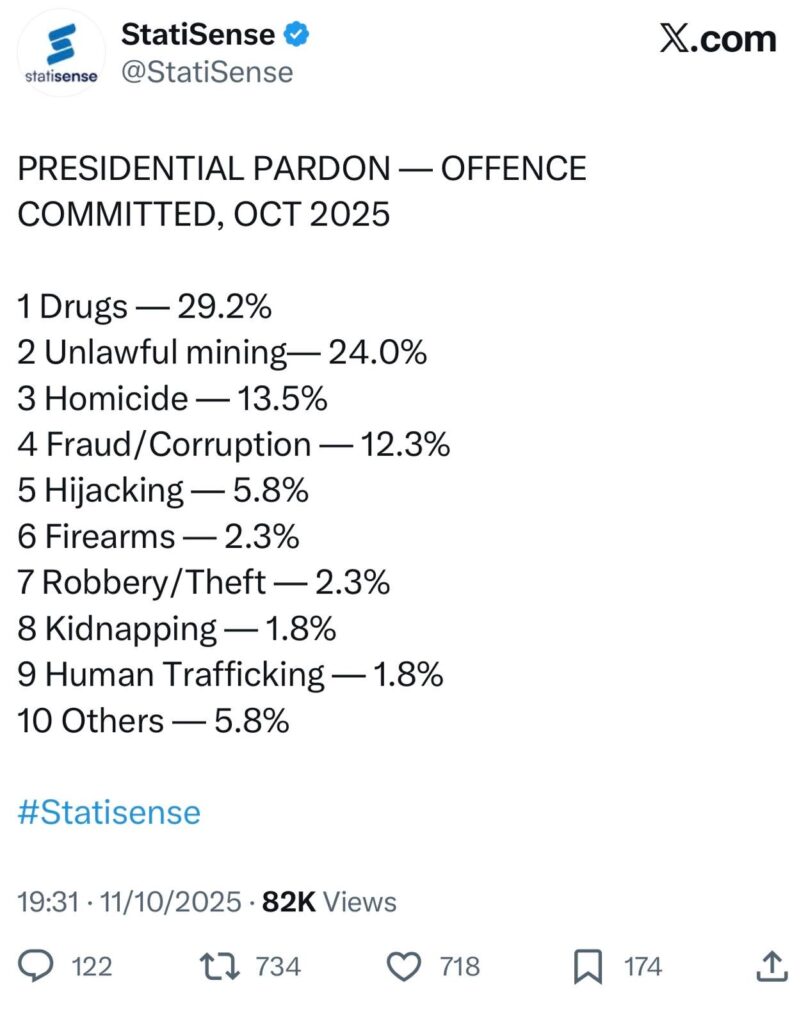On Saturday, 11th October, 2025, Nigerians were shocked with a controversial announcement, with President Bola Ahmed Tinubu granting prerogative pardon to Maryam Sanda, a woman who made headlines throughout the nation for killing his husband in 2017.
Despite other 174 ex–convicts who received the President’s mercy, Sanda’s case has been so central in generating public discussion, with the majority of people criticizing the president’s actions as baseless, lacking spirit, and unjustified.
Recall that Maryam Sanda started facing criminal prosecution in 2017, after she was alleged of stabbing her husband to death, following a domestic altercation.
Bilyaminu Bello, the victim of the homicide, was the son of the former national chairman of the People Democratic Party (PDP).
In January 2020, Ms Sanda was convicted of culpable homicide and sentenced to death after the court satisfied the prosecution to have proven the guilt of the defendant beyond reasonable doubt.
Meanwhile, President Tinubu’s decision came after Ms Sanda had spent barely six years and eight months behind bars at Suleja Medium Security Custodial Centre.
Maryam Sanda’s Clemency Stirs Mixed Reactions
Several Nigerians both online and offline have condemned President Tinubu for his action, with several social media users focusing their criticism on the irrationality of the prerogative pardon to serve its purpose.

Emphasising on why Ms Sanda’s pardon is unjust, Shakioye Azeezat Omotolani advised people to distance themselves from any physical altercation that may lead to fight, noting that there’s no justice in Nigeria for anyone that died from such an ill–fate incident.
“I witnessed a very sad killing growing up between cousins, the killer was later freed from jail. Ever since then, I run as far as my legs can carry me from situations or people that want to kill me. You only claim your rights when you’re alive,” he stated.
Re–enforcing the same sentiment, Yusuf Abubakar remarked that Ms Sanda’s case is deliberate homicide involving intentional killing of her husband which raised significant concerns regarding the Nigerian justice system, and the integrity of the country’s legal system.
If Ms Sanda can receive such a pardon or leniency, he said, that would undermine the rule of law, and that sends a troubling message that such criminal acts can be excused or overlooked.
“The expectation for consistent and fair application of justice is paramount; allowing her to escape the appropriate punishment, such as hanging, would not only mock the judiciary but also diminish public trust in the legal system to protect society and hold individuals accountable for their actions.”
“Justice must be served to uphold the sanctity of life and reinforce the consequences of criminal behavior.”
Moyinoluwa Adewodun Joel said “My lawyer will always say that don’t allow anyone to kill you because he or she may get a presidential pardon tomorrow.”
Meanwhile, in contrast to the above reasoning, some parts of the public have hailed the president’s action, while justifying the pardon.
Gbolahan Badru argued that Ms Sanda’s pardon reawakened the major reason behind the provision of section 175 of the 1999 Nigeria Constitution.
The power of pardon was never motivated to rewrite but to temper justice, he continued, pointing out that the system was designed to fill the human gap where the law due to its cold precision can never address that.
“Sanda’s story, told in the shadows of constant domestic abuse and emotional trauma, reminds us that crime sometimes grows from wounds that never healed,” Badru said, admitting to the controversial nature of the pardon.
He further stated that the pardon might not be an erasure of guilt but an acknowledgment of grief, and perhaps, a nod to the children left behind, whose lives must now rise from the ruins of that tragic home.
“This power granted to the president says that while justice is served by law, mercy is served by humanity, and both are arms of the same republic.
“On a day where the whole world gathered together to celebrate the girl’s child and her strength, there was no better means of celebration than the pardon granted to a murderer whose murderous fate was decided by constant matrimonial and domestic violence availed by her victim,” he concluded highlighting the nexus between the pardon and celebration of International Girls’ Day.
Also, Adamu Ohinoyi said: “The reasoning in granting her pardon was a good decision, she had two children and those children should not be made to lose two parents. Any person with human empathy should empathise with the children.”
Tinubu’s Presidential Pardon, What, And Who Does It Serves

Under section 175, subsection 1 of the 1999 Nigeria Constitution, the President is conferred with a pardoning power with respect to federal offences. The section also made the President the ultimate judge of the entitlement of any person to be granted such pardon.
On Saturday, in exercising this constitutional power, President Tinubu, through his Special Adviser on Information and Strategy, Bayo Onanuga, released a full list of 175 individuals, including Maryam Sanda, who was announced to have been granted clemency.
Among the beneficiaries of this pardon, 29.2–percent were convicted for committing drugs–related offences, 24.0–percent committed a crime of unlawful mining, 13.5–percent committed homicide (such as the case of Ms Sanda).
Other figures are: fraud and corruption (12.3–percent), hijacking (5.8–percent), firearms (2.3–percent), robbery and theft (2.3–percent), kidnapping (1.8–percent), human trafficking (1.8–percent), and others offences shared 5.8–percent.
What Does Legal Expert Says
Commenting on the President’s pardon, Ahmed Musa, a Kano–based legal practitioner, maintained that while the moves was framed as gesture of mercy and justice reform, the exercise has the tendency of undermining the integrity of judicial system in Nigeria, while endangering witnesses, and sending troubling signals amid the country’s fragile economic conditions.

Mr Musa noted that in the case of murder and violent crimes, clemency is a devastating blow awakening the pains of the victims’ families—as many endured years of grief, court battles, and public scrutiny to ensure justice was served. Releasing those convicted individuals, he mentioned, could send a message that political consideration is primary to sufferings of the victims’ families.
Other eyebrows raised by the president’s pardon, as argued by the legal practitioner, included undermining the prosecution’s rigorous efforts, and risking the witnesses’ safety.
He concluded that such mass pardons; especially the release of white–collar criminals, and drug offenders, have the implication of deepening the volatile economy of Nigeria, eroding public trust in government, while chasing away international investors.
“While the presidential pardons are constitutionally permitted, their use must be judicious and transparent. The release of convicts without a robust reintegration plan could strain public services, and increase social unrest.”
“Nigeria must tread carefully to ensure that mercy does not become a mask for impunity.”

